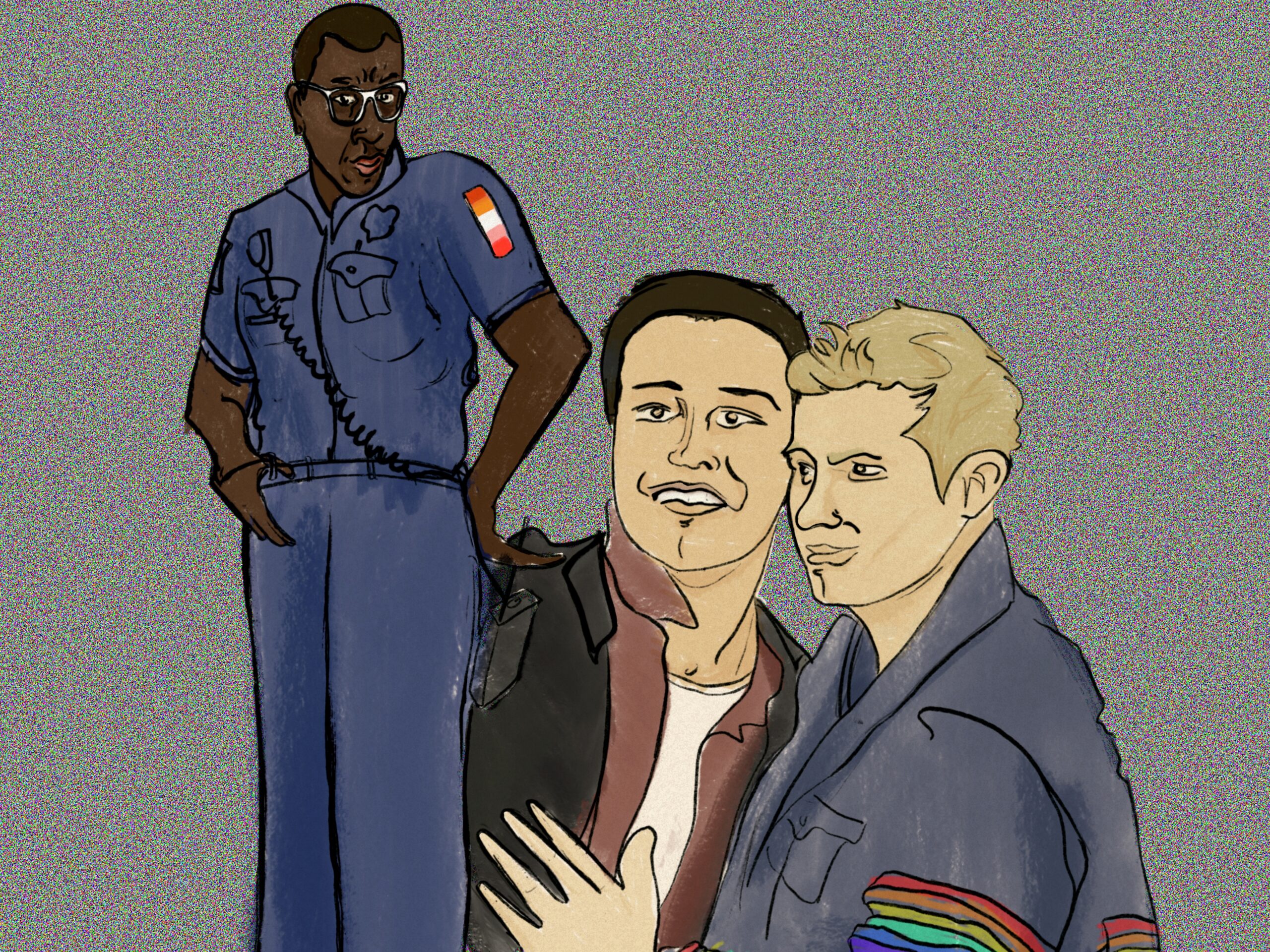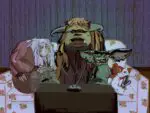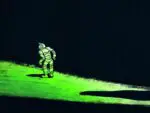Despite a history of queer representation on the show – including lesbian main character Hen Wilson – the first responder procedural “9-1-1” recently garnered media buzz around this season’s bisexual storyline for fan favorite Buck.
The first responder procedural “9-1-1” recently garnered a spur of media attention following the show’s switch to the ABC network, and a new bisexual storyline for fan-favorite character Buck.
As with many depictions of queerness on network television, the storyline came with a mix of audience support and backlash. This backlash played out in negative social media comments with unhappy fans declaring the show “woke”, insisting the new storyline ruined the show for them. While no doubt vocal in their dislike, this portion of the fanbase is in the minority given a mass amount of positive reactions and a significant increase in viewership of the show. Oliver Stark, who plays Buck, took to social media to thank fans for positive reactions while telling unhappy viewers that “you are not required to announce your departure.”
While the show has many queer characters, Buck is the first character to discover his sexuality and go through a coming-out arc on screen. Michael, a featured character in the first few seasons, came out as gay, but offscreen sometime before the timeline of the first episode. His struggle is not in coming out but in navigating new circumstances as a gay man in his 40s with two kids.
Despite some backlash, Buck’s storyline didn’t change the core of what “9-1-1” is; if it’s a queer show now, it was a queer show before. To claim “9-1-1” is not a queer show requires the audience to completely overlook so many facets of the series, including featured character Henrietta “Hen” Wilson.
The writers’ choice for Wilson to go through a cheating storyline in the first season is refreshingly nuanced. By presenting the scandal in the first season, the show avoids falling into the trap of cheating being used only for extraneous drama. As someone who watched “Grey’s Anatomy”, it was frustrating to watch Callie and Arizona go through a season of conflict and then have it escalate into a cheating storyline. When Wilson decides to cheat on her wife, it isn’t with someone she just met but rather with her ex-girlfriend Eva. Through an emotional performance from actress Aisha Hinds (who plays Wilson), it’s clear how this past relationship impacts the one with her wife Karen beyond the act of cheating. The audience learns that not only do Wilson and Eva have unfinished business, but Karen and Wilson’s kid Denny is biologically Eva’s. While the couple adopted him, the fact of his parentage will forever link them to Eva.
Unlike other cheating arcs on television, Hen’s decision to cheat on her wife, Karen, is never framed with her denying responsibility. Hen emphasizes her choice in the action, and never tries shifting the blame to another party. When trying to explain the situation to Karen, Hen expresses regret about what happened, calling herself a “mess”, but insists on her culpability in cheating, even if the actions don’t align with who she thinks she is. This insistence on choice stands out even more given when the events take place, an episode titled “Scary Moon (Creepy AF).” Throughout the episode, the calls the 118 are dispatched to are bizarre, even for them, resulting in several of Hen’s coworkers insisting out-of-character behavior is the full moon’s fault, not anyone’s own. Yet Hen refuses to take part in this behavior, choosing instead to ask herself why someone who identifies as a family woman would choose to cheat.
With cheating out of the way, Hen and Karen’s relationship faces different hurdles. Hen and Karen rebuild their relationship with scenes dedicated to them figuring out how to trust each other again. Hen reaffirms her commitment to their relationship and Karen decides to come back home after choosing to take their son Denny to stay with her parents. Once they’re on solid ground, their narrative turns towards expanding their family with screentime exploring the realities of IVF and fertility struggles, adoption, and foster parenting.
The show even tackles homophobia in a new way. In the fifth season, it’s revealed that Hen’s mom Toni didn’t come to her and Karen’s wedding. While there are numerous examples on the show of louder homophobia, this circumstance is significant for its depiction of a quieter one that isn’t loud or violent, one that comes from a person’s own family.
In terms of comparing the two, one example is the season two episode “Awful People.” The police officer Athena is called to a disturbance at a funeral and finds a crowd of people trying to push past a fence holding homophobic signs and loudly heckling at people grieving. Although the funeral is held for a military officer who found distinction in the service, the crowd is convinced he’s going to hell because he’s gay.
While Hen and Karen were able to get married without having slurs thrown at them, Karen reveals how it’s hard to think of their wedding day as fully happy given how sad Hen was. Given this sadness, what Toni does next is all the more impactful. Toni admits she was in the wrong and organizes a vow renewal for Hen and Karen. She’s able to reconcile her relationship with Hen after years of not accepting Hen as a lesbian. While this manifested in her not coming to the initial wedding, this intolerance was further portrayed in Toni’s insistence on buying dresses for Hen, despite Hen’s obvious dislike and discomfort in dresses.
The show has consistently explored a sense of otherness Hen feels as a masculine, black lesbian, most notably in the flashback episode “Hen Begins.” Unlike the Hen in other episodes, here she wears feminine outfits and dresses and bright lipstick, along with a weave that covers up her buzzcut. The idea of choice characteristic of current Hen is distant from the backstory Hen with the way Hen describes a career she is blatantly miserable in. She describes her career as a pharma rep not as something she wants to do or enjoys but as something she felt she “was supposed to be doing at the time.” While the feminine aesthetic falls away from Hen throughout the episode, the otherness does not.
Much like fans trying to remind casual viewers of the show’s queer representation, Hen demands the attention of predominantly white males in an attempt to make them see her. She addresses the different facets of her identity— a woman, a black woman, a lesbian — and doesn’t ask for them to love or like her, but to see her the way she sees them. Hen gives her team respect for good decisions made during emergency calls and is done accepting the blatant disrespect or ignorance she’s been getting in return. Moments like that on the show are to be celebrated. It’s great to have a black lesbian main character on an ensemble show where there are discussions on what it means to be an othered minority in a white macho man’s world.
While this season’s storyline leaves greater hope for more screen time dedicated to queer relationships and characters, it also takes the discussion of queerness back into the realm of whiteness and the ideas of male masculinity. Buck’s coming out storyline has featured his budding relationship with fellow first responder Tommy Kinard, another white man. During their first date, Tommy remarks on how firefighting is a pretty “macho line of work” and his surprise at how accepting people are. Being queer can often be an intersectional experience, and it’s important to showcase a variety of different portrayals. Moreover, while fans are right to be excited about the new storyline, it is worth recognizing the queer characters who have always been a part of “9-1-1” even before it “became” queer.

















